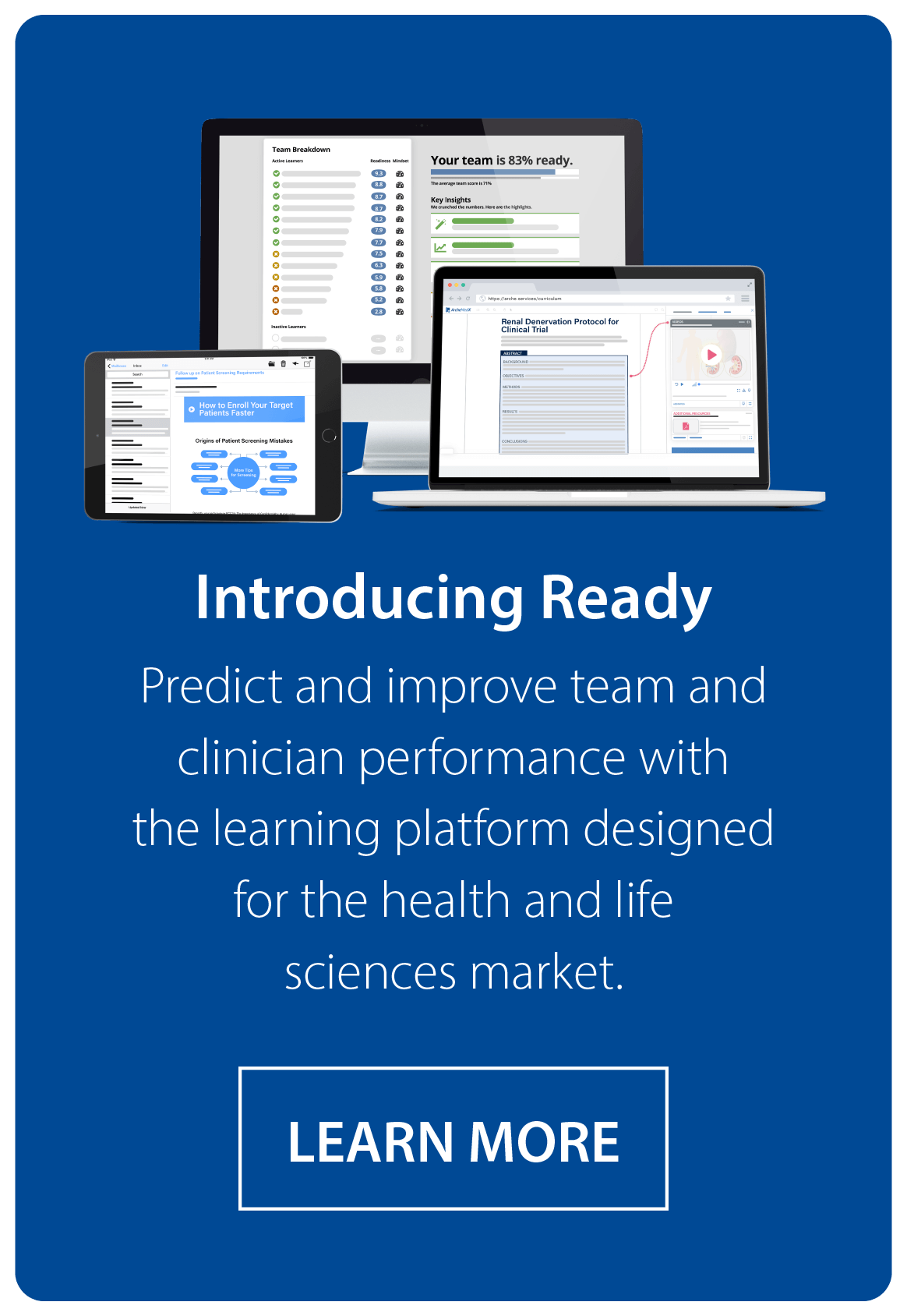As clinical trials ground to a halt in Q1 of this year, no one knew how our industry would eventually move forward. Now, 6 months later – there are still so many unanswered questions but one trend has emerged as a dominant theme: making virtual clinical trials a reality.
That’s easy to say — but much harder in practice. Are we even ready as an industry for a fully virtual clinical trial? Many say no — that there are many steps we need to take before we are.
But what can we do today to equip our teams, sites, and organizations to emerge from the pandemic successfully?
To answer this question, we surveyed clinical operations professionals from Pharmaceuticals, Biotech, and CROs (plus a few others). In the survey we discovered the plans that these leaders have for virtual adoption, whether to enable a full virtual trial or to improve more traditional studies. We focused specifically on the study start-up, as virtualizing this stage of the clinical trial is critical to resuming operations.
The full report is available now, but this article will summarize some of the most interesting high-level findings.
Clinical operations leaders have changed their mind on virtual tech use
Our industry is notoriously risk-averse and slow to adopt innovation without thorough investigation.
However, our findings reveal a marked shift in how clinical operations leaders are approaching change. Leaders are rapidly adopting remote technologies and cutting through the inertia that often hinders such changes.
74% are adopting technology that supports virtual activities everywhere possible. 49% are converting all clinical operations meetings to virtual ones.
Virtual investigator meetings exemplify how leaders have changed their minds
COVID-19’s restrictions have catalyzed the industry into a major change in perception around the utility of virtual meetings. This is most notable for the Principal Investigator (PI) meeting.
Live, face-to-face has been the industry standard to date, despite the well-documented cost of putting them on. Our data validated this belief as 68% felt PI meetings should be in person before COVID-19. Even more shocking, nearly half (43%) of CRO and Sponsors reported never having even tried using on-demand virtual meetings to perform PI meetings.
Despite the demonstrated operational and cost benefits of digitizing these meetings, clinical operations professionals had avoided making the transition…until now.
The pandemic has been a powerful catalyst for digital adoption. Today, only 15% now believe that the PI meeting should be held face-to-face. This is a major shift in perception, and is a particularly important opportunity because it will help many sponsors (especially those facing investor and cash flow pressure) to more quickly and cheaply restart.
We’ve written about this very topic recently, especially in our recent blog “Running a Virtual Investigator Meeting in 4 Steps.” Of note, the article explores how novel data that is made available through the use of virtual meeting technology can provide additional operational value. This could include data about attendee knowledge, level of confidence, or comfort with specific objectives in the protocol. This will help you to make more informed decisions about site selection and overall readiness — another emerging theme from our survey.
Clinical Trial Readiness is an area that clinical operations leaders want to improve
Before COVID-19 impacts hit, most life sciences organizations felt that they were effective in identifying site readiness and addressing issues. In fact, 76% said they were effective in identifying which sites were ready to start recruiting.
But again — the data reveals a complete reversal in opinion. Now, 78% say they need to improve how they identify sites that are ready to perform. Why the shift in perception — and what does this have to do with virtualization?
 What we know is that in-person visits and meetings are off the table for now. Because of this, the industry is beginning to commit to a future that is virtual, and in a virtual world, data is so much easier to acquire and act on.
What we know is that in-person visits and meetings are off the table for now. Because of this, the industry is beginning to commit to a future that is virtual, and in a virtual world, data is so much easier to acquire and act on.
A concept like clinical trial readiness, specifically trial site readiness, has been a disregarded but problematic reality for too long. By virtualizing the study start-up, we can better understand which sites are prepared to enroll subjects. We can also gather more data about investigators and site staff skills so we can better prepare all of them for success.
We will see broad virtualization across the clinical trial, with an emphasis on the study start-up
89% of survey respondents are expanding the use of virtual technology across clinical trials. The only holdouts in the response were those who replied neutrally to this statement.
This could be because of budget constraints, pre-existing digital maturity, or stalled trials with no clear path forward. Regardless, the resulting data shows overwhelming consensus that virtual ways to perform a trial are here to stay, and laggards will be left behind.
With most travel and physical interaction greatly reduced, virtual training is an obvious opportunity. Between the great reduction in travel costs and the better insight into effectiveness, virtual training will likely become the norm for the long-term.

The clinical trial start-up activities are a ripe opportunity for virtualization, since many of them are training-focused. By far, these activities were the most “digitally immature” — in that a very low percentage of Sponsors and CROs were using virtual technology.
Across site selection, investigator meetings, and site initiation, respondents overwhelmingly agreed that they will be increasing the use of virtual methods, or replacing face-to-face methods altogether.
There are some differing opinions between CROs and Sponsors
CROs and Sponsors can partner to expedite timelines in a newly virtual clinical operations environment. But each type of organization needs to be aware of the other’s priorities and capabilities in order to achieve the best results.
Based on our findings, we recommend that Sponsors take the following actions:
- If you work with CROs, ensure you select partners whose capabilities align to your needs.
- If you don’t outsource to CROs, recognize that the rest of the market is virtualizing and don’t be left behind.
- Ensure you have enough oversight and ongoing access into the virtual delivery of any trial content.
- Consider taking ownership of virtual delivery of content as your own responsibility – in order to ensure consistency.
One of the best ways to take ownership of the digital transformation taking place in study start-up is to adopt your own processes and virtual clinical trial solutions, like Ready by ArcheMedX.
CROs had some differing priorities from Sponsors in the survey, which was interesting to note and the full details are available in the report.
But as we noted, clinical trial readiness is a high priority for Sponsors, and so CROs need to establish a plan for that.
Some of the action steps we recommend for CROs with this knowledge include:
- Make ensuring and measuring site readiness your differentiator.
- Deliver on the virtual site start-up activities that Sponsors value.
- Not all Sponsors are ready for virtual delivery, so make the transition your strength.
- Stand out with scalable virtual clinical trial technology like Ready by ArcheMedX that allows Sponsor access and oversight.
Many more insights into the future of virtual clinical trials are available in the report
The full report, titled “COVID-19’s Impact on Virtual Tech in Clinical Trials” is available for download now. This report is 40 pages of brand-new insights into how leaders in pharmaceuticals, biotech, and clinical research organizations are shifting their priorities post-pandemic.
These findings are especially relevant, as the majority of clinical trials ground to a halt in response to COVID-19’s spread this year. As clinical operations teams prepare to restart studies, they are entering uncharted territory with rapidly changing processes and priorities.
One thing is clear: the industry is marching towards making virtual clinical trials a reality, but there’s much work to be done. Ensure your plans place you as a leader, and not a laggard, with the insight into what the rest of the industry is doing.






